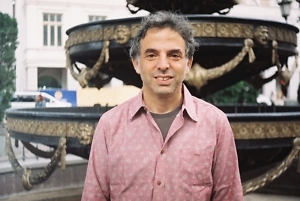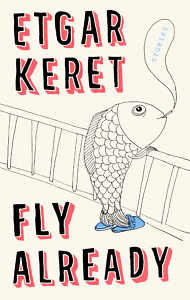A Mystical Blend of Humor and Heartbreak
Realism and fantasy mix in Etgar Keret’s Fly Already
A talking goldfish. Fathers transformed into pet rabbits. A loser shot out of a circus cannon, soaring over his dismal life to land safely, reborn. The stories of Israeli writer Etgar Keret comprise a kind of magic show, a mystical whirl of light and dark, humor and heartbreak. His new collection, Fly Already, transports us into his quirky yet profound world, shaped by an obsession with the twinned masks of comedy and tragedy reminiscent of writers as varied as George Saunders, Gary Shteyngart, and Isaac Bashevis Singer.

Keret is acclaimed for his deft use of the short-short form, and some of the pieces in Fly Already are only a couple of pages long. They’re mostly set in present-day Israel, peopled with regular folks who crave love and jobs, sex and drugs, but who also contend with menace beneath the surface of everyday life, the blood-drenched politics of the Middle East as backdrop. To Keret’s credit, he never brings the Palestinian conflict into full focus, allowing his characters (usually men) to stumble through mishaps of their own making. Accustomed to the threats of bombs and missiles, they’re more preoccupied with stalled romances, grams of weed, and the insatiable demands of children.
Their reversals of fortune are both sudden and moving. In the title story, a widower attempts to prevent a suicide by placating his son’s desire to watch a man leap from the roof of an apartment building. A tour of Yad Vashem, the Holocaust memorial in Jerusalem, forces an American couple to grapple with the consequences of an aborted pregnancy. An overweight, unemployed 50-year-old wins the lottery but prefers his elderly mother’s crumb cake instead. Keret’s ear for the whacky and revelatory is pitch-perfect.
Other stories are less realistic, more “meta.” The brilliant “Windows” evokes a near future in which our fantasies are made flesh. There’s a touch of Marc Chagall’s whimsy in “Tabula Rasa,” which portrays an institution for children afflicted with a rare genetic condition. Keret connects the children’s inner lives to a larger sorrow, as in the boy A.’s recurring dream about painting:
[T]he only thing that kept the dream from being completely pleasant was a huge cow with human eyes that was always grazing right next to A.’s easel. There was something infuriating about that cow: the spittle dripping from its mouth, the sad look it gave A., and the black spots on its back, which looked less like spots and more like a map of the world.
 Like Chagall before him, Keret taps Jewish folklore and even the Torah. The cheeky “Ladder” reimagines the story of Jacob from the perspective of angels in heaven. Gabriel introduces the fresh recruit Zvi to the angel who wrestled with Jacob as he returned to Canaan. “Jacob, the angel told Zvi, was very weak physically. … [he] struggled and strained and sweated rivers. The smell of Jacob’s perspiration was so strong that it almost made the angel pass out.” It’s precisely this playfulness that fuels Fly Already and makes it an enchanting read.
Like Chagall before him, Keret taps Jewish folklore and even the Torah. The cheeky “Ladder” reimagines the story of Jacob from the perspective of angels in heaven. Gabriel introduces the fresh recruit Zvi to the angel who wrestled with Jacob as he returned to Canaan. “Jacob, the angel told Zvi, was very weak physically. … [he] struggled and strained and sweated rivers. The smell of Jacob’s perspiration was so strong that it almost made the angel pass out.” It’s precisely this playfulness that fuels Fly Already and makes it an enchanting read.
Spliced among the collection’s later pieces are emails between the bitter son of a Holocaust survivor and a space alien posing as the curator of an “escape room.” Keret’s stories are not all created equal, but happily the misses are few. Fly Already showcases a writer with a wealth of tricks up his sleeve and a rich, slangy voice, a recognized talent on the global stage who deserves a wider American audience.

Hamilton Cain is the author of This Boy’s Faith: Notes from a Southern Baptist Upbringing and a frequent reviewer for O, the Oprah Magazine; the Minneapolis Star Tribune; and The Barnes & Noble Review. A native of Chattanooga, he lives in Brooklyn, New York.


